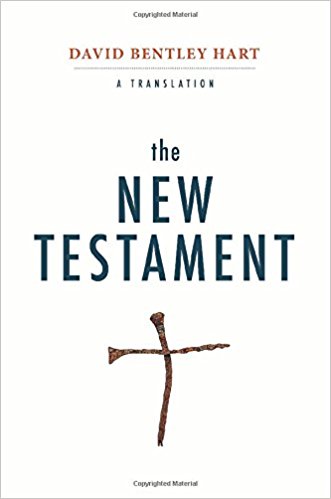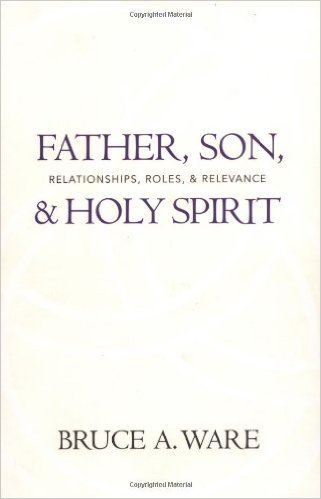
David Bentley Hart has “a perverse aversion to common phrases” and comes wearing the cloak of Eastern Orthodoxy, so his translation is not at all like any other I’ve ever read. His footnotes explaining his translation choices are fiery, bulldoggish, and controversial. Is he a heretic? Is he a theological liberal? Is he just a blowhard with a few axes to grind? Is he right? One thing is sure, Hart is a provocateur of deeper thought for all who engage in his writings.
Most English Translations Lousy: Hart believes that all standard English translations of the Bible make essential concepts of the New Testament largely “impenetrable.” The truth that the original authors intended becomes “hidden” and “perilously hazy.” The reason he gives is that the work is done by committee. Collaboration according to Hart is a terrible idea for translation work because it becomes “ineluctably mired in the anodyne blandness and imprecision of ‘diplomatic’ accord.” Hart believes a straight shooter is needed who don’t give a damn about great traditions and what others might think, but who will only deliver the goods on what the New Testament actually says, evidently Hart is that man. So with that rather humble start off we go.
Hart smells of Universalism: Romans 5:18 is the clincher for him. He says in his comments on the verse “Christ’s act of righteousness brings righteousness and life to absolutely everyone. Whether intentional or not, the plain meaning of the verse is that of universal condemnations annulled by universal salvation.”
Let the fire burn out: Hart argues “There are only three verses that seem to threaten eternal punishment for the wicked (though, in fact, none of them actually does)” And then he attacks the veracity of what he refers to as “the God of love’s perpetual torture chamber” with astonishing ferocity. Clearly, he doesn’t want eternal hell to be true, and he has prepared an entire armoury of reasons to support its rejection. The Greek word for age, from which spin off all the English translations for eternal and everlasting is genuinely ambiguous. In fact, Hart claims that the word “never clearly means eternal or everlasting in any incontrovertible sense.” Also “Gehenna” never meant hell as it has come to be known in English. First century Judaism in spite of its various differences were unanimous that any concept of hell was for ultimate purification. Metaphor was the idiom of the day, squeezing any literal interpretations from the dramatic language surrounding the dark side of the afterlife is to Hart the longest of reaches. Hart piles into his arguments church father after church father, 20 in all I believe, who rejected the idea that hell was a “literal kingdom of ingenious eternal tortures ruled by Satan” Paul doesn’t talk about it, nor do any early confessional texts, nor does the 4th gospel, or the pastoral epistles. Once Hart has dumped his historical truckload of evidence upon us he lets us know that “the very concept of eternal hell is nearly as historically suspect as it is morally unintelligible.” If we missed the boat so badly on this where did we go wrong? The culprit is “Latin-speaking” Augustine he tells us. Hart is Eastern Orthodox so it’s fitting that he would blame the Western church. But is he right? I hope so, who wouldn’t wish it?
Hart is no fan of complementarianism: He mentions that “Junia” the apostle referred to in Romans 16 is most certainly a woman. No one in the patristic period denied this and “there is no instance anywhere in the vast literary remains of antiquity in either Latin or Greek where the name is masculine. John Chrysostom, for instance, opined that she must have been a woman of superlative wisdom since Paul accords her the title Apostle.” It wasn’t until 1243 that Giles of Rome (who probably knew no Greek) began to argue that Junia must be a man. Then Hart looks to take a swipe at complementarianism by his following statement “the argument remains popular to this day among those eager to make the church safe for misogyny, however it can safely be dismissed as nonsense.”
Dodging the obvious: In 1 Cor 6:9 he is super careful not to use the word, homosexual. Even though the literal meaning of the terms are “effeminate male partner” and “men who bed men.” Instead, he opts for the term “feckless sensualists” and “men who couple with catamites.” He refuses the word homosexual because in that day there would have been no concept of homoerotic sexual identity like there is today. Hart is confident that the specific sin Paul had in mind was a masters exploitation of young male slaves and so he leaves it at that. Any modern day application should not in his estimation be included in the translation. He draws the same conclusions in 1 Timothy 1:10. Fair enough, although, one wonders if Harts careful tip-toeing is a result of modern cultural pressure as much as it is cautious exegesis.
Don’t Worship the Bible! Evangelical and Fundamentalist efforts to shore up confidence in a reliable Bible by making strong statements to its inerrancy don’t impress Hart at all.
All Christians believe that the New Testament is divinely inspired; but any coherent account of what this means must involve an acknowledgement that God speaks through human beings, in all their historical cultural and personal contingency. For those, however, who not only believe that scripture is inspired, but who are also deeply committed to “literalist, “inerrantist” or “dictational” understandings of inspiration, all the words of the Bible must be understood as direct locutions of God, passing through their human authors like sunlight through the clearest glass, and the canon of the New Testament — even though it took a few centuries to concreace into its present form, and has never really existed as anything but a shimmering cloud of countless variants — must be understood as a flawlessly immediate communication, in its every historical and lexical detail, of the teaching of the Holy Spirit and of the faith of the apostolic church. That has never been the only or even the dominant, Christian understanding of Scriptural inspiration. Many modern Christians, in fact, might be quite surprised at the speculative boldness and critical diffidence with which some of the greatest exegetes of Christian late antiquity and the Middle ages approached the Bible. Hart concludes his thoughts on inspiration lamenting the fact that “with the rise of the fundamentalist movement of the twentieth century (in-errantist views) have spread far and wide especially in their acute and virulent forms.
The Bible has issues: He has no care or fear in talking about textual variants, what belongs, what doesn’t belong, what’s a mistake, what isn’t a mistake. On the one hand, it’s refreshing to address some elephants that have long been standing quietly in the room, on the other hand, it’s a bit unnerving for one who grew up in a tradition of boot stepping allegiance to the Bibles inherency. After reading Hart, if he is to be believed, a strict “inerrantist” position is no longer possible.
Let the women be silent verse doesn’t even belong. This passage according to Hart doesn’t belong at all. It’s a late dated interpolation. Internally it breaks the flow of the text and contradicts chapter 11 in which women clearly are encouraged not to be silent in the church. It also contradicts Paul’s radically egalitarian point of view in places like Galatians 3:28. Externally a good number of ancient texts have the paragraph in different spots, one even footnotes it at the bottom of a page. Most scholars have now concluded the passage to be spurious. — It would have been nice to get that one right. This little paragraph screwed up church history big time!
Faithfulness is better than faith: In many places he changes the term often translated “faith” to “faithfulness” Hart is no fan of the protestant Reformation. He refers to the reformers and their offspring as “demonstrably wrong” in their understanding of Paul’s views on salvation. Paul taught that we are not justified by the works of the law (circumcision, kosher laws etc.), but we are justified only by “a faithfulness that necessarily entails works of love — good deeds— in respect of which one will be judged and either rewarded or purged.” The notion that justification is merely a formal or forensic imputation of righteousness rather than a real corrective transformation is a meaning that simply doesn’t exist in the history of the word. Salvation is a process far more than it is a declaration.
Jewish/Greek/Roman Mythology — Hart enlightens us on how the New Testament interacts with the mythologies of the day. One example is the Jewish tradition which held that God deputized angels to give out the law to the Jewish people, the only problem with this plan is that the Angels didn’t always deliver God’s instructions correctly! Therefore any law spoken through the angels is not equal to or as final as the word spoken directly by the Lord. You can imagine the debates already in ancient Judaism as to the source of some particular laws over others.
The belief that we are guilty by birth is a mistake. Romans 5:10 is “one of the most consequential mistranslations in Christian History” — What happened? The two little greek words ἐφ’ ᾧ in the Western tradition were translated into Latin to mean that death comes to us “because” we are sinners. Creating the Western theological position of original guilt. The idea that in some sense all human beings had sinned in Adam, and that therefore everyone is born already damnably guilty in the eyes of God. The Eastern tradition which had a better understanding of Greek drew no such conclusions. Humanity has not inherited a condition of criminal culpability at birth, rather, humanity has been exposed to the contagion of sin and the disease of death. The point of Romans is that Jesus reverses the disease of death by introducing eternal life in him. Death doesn’t come because we are sinners, death and sin have infected our planet, and we are caught up in the mess is the idea.
Don’t take the Bible so literally, the apostle Paul didn’t! — His translation and comments on I Cor 10:11 — Now these things happened to them figuratively, and were written for the purpose of our admonition… As should be obvious, Paul frequently allegorizes Hebrew scripture; the “spiritual reading” of scripture typical of the Church Fathers of the early centuries was not their invention, nor just something borrowed from pagan culture, but was already a widely accepted hermeneutical practice among Jewish scholars. So it is not anachronistic to read Paul here as saying that the stories he is repeating are not accurate historical accounts of actual events, but allegorical tales composed for the edification of readers. Hart is angling for a less historically rigid Bible.
Revelation is history. The beast of Revelation is almost certainly Nero Hart says. Evidently, Nero had become a legend in the 1st century, and many had thought that his apparent suicide in 68 a.d. was a fake and that he would return. So much of Revelation according to Hart was more about current events than future events.
Penal substitutionary atonement is not a Biblical idea. As Christianity spread out through other cultures and languages words like ransom and redemption began to broaden in meaning:
Some Christians came to imagine that the word referred to a ransom paid to God the Father by the Son, to appease God’s righteous wrath, or to repair his injured dignity, or to yield tribute to the awful majesty of his sovereignty. That idea is entirely alien to the way the word is used in the New Testament; there is no suggestion there that, in Christ God pays God off, or God rescues us from God; instead the work of salvation is depicted as a single, unified act of rescue, whereby God the Father, through the Son, redeems his children from the slavery into which they have been sold.



